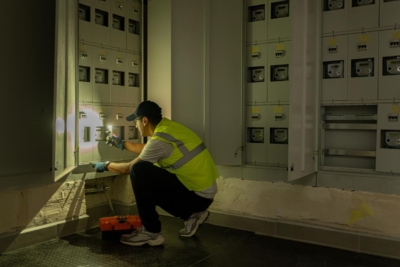Having a handle on your home’s electrical needs and how everything works can be valuable, especially if you encounter an issue. But the truth is that there can be a lot to keep track of. It’s easy to get confused. Let us help at Spring Power and Gas—it’s what we’ve been doing for residents of Pennsylvania, New Jersey, and Maryland for years.
Let’s explore the definitions, similarities, differences, and frequently asked questions concerning power surges vs. power outages.
What Is a Power Surge?
The standard power outlet in the United States supplies 110–120 volts (although some appliances may require more—which is why an electric dryer requires a special type of plug and outlet). When the items plugged in pull the expected amount of power, everything works as expected. But sometimes—for a variety of reasons—power spikes beyond the expected range. That results in a power surge.
What Causes a Power Surge?
There are a number of potential causes that could result in a power surge:
- Wiring Issues: Issues with your home’s electrical wiring can lead to multiple problems, including power surges. A burning smell or buzzing sound are also symptoms to watch out for.
- Electrical Overloads: We mentioned above that the average outlet is equipped to handle 120 volts. If whatever is plugged in exceeds that—for example, if you’ve hooked up an extension cord or power strip with way too much plugged into it—you may experience a power surge.
- Lightning Strikes: Lightning can do much worse than a power surge, but it’s still on the list of possibilities. You should unplug everything that isn’t protected from surges during a lightning storm to avoid damage.
- Power Outages: How can a power outage result in a power surge? The issue actually happens when the power is restored later. There’s often a brief increase in current when the power comes back on.
What Is a Power Outage?
So, a power outage can result in a power surge, but what is a power outage?
This is pretty straightforward: A power outage is whenever electricity does not reach the end user. Power outages can be:
- Planned: When residents are notified beforehand due to planned maintenance.
- Unplanned: When power is lost unexpectedly, usually from a storm, accident, or failure.
- Limited: Only impacting a single home or group of houses.
- Broader: Impact an entire community or even a whole city.
What Causes a Power Outage?
As with power surges, multiple potential causes might cause a home to lose power entirely.
- Storms: All sorts of storms can result in a power outage. Lightning, hail, high winds, snow, and even particularly heavy rain might knock out a piece of infrastructure. Of course, natural disasters like tornadoes and hurricanes frequently lead to outages.
- Accidents: A vehicle can collide with a transformer or utility pole, leaving people without power. Someone may dig in an area that hasn’t been cleared for digging, hitting an underground line. Issues at the electric company or somewhere down the line might also be responsible.
- Wildlife: Squirrels. It’s not always squirrels—it could be snakes or chipmunks or other small animals—but wild animals can cause utility infrastructure to short circuit.
- Trees: If you see a tree with a branch extending above a power line, it needs to be trimmed by a professional. Otherwise, there are plenty of everyday occurrences—like wind or ice or a chubby squirrel—that can lead to that branch falling into the power line and resulting in an outage.
- High Demand: Electric companies do not have unlimited resources. If demand exceeds capacity, there may be rolling blackouts or brownouts (when the amount of available power is reduced).
What Are the Similarities Between a Power Surge and Power Outage?
Both power surges and outages involve electricity. That’s the main similarity. As we said above, a power outage can lead to a power surge when everything turns back on.
What Are the Differences Between a Power Surge and a Power Outage?
In some ways, surges and outages are opposites. A power outage means there’s no available power. A power surge means there’s too much. These are distinct electrical occurrences that have no real overlap in definition.
Weather the Storms with Spring Power & Gas
When it comes to power outages, power surges, and everything else related to energy, Spring Power & Gas has your back. Our gas and electric company is perfect for Pennsylvania, Maryland, and New Jersey residents who care about the environment and want to make a difference. Reach out today for more information.
No matter where you live, our guides can help you live a greener life:





